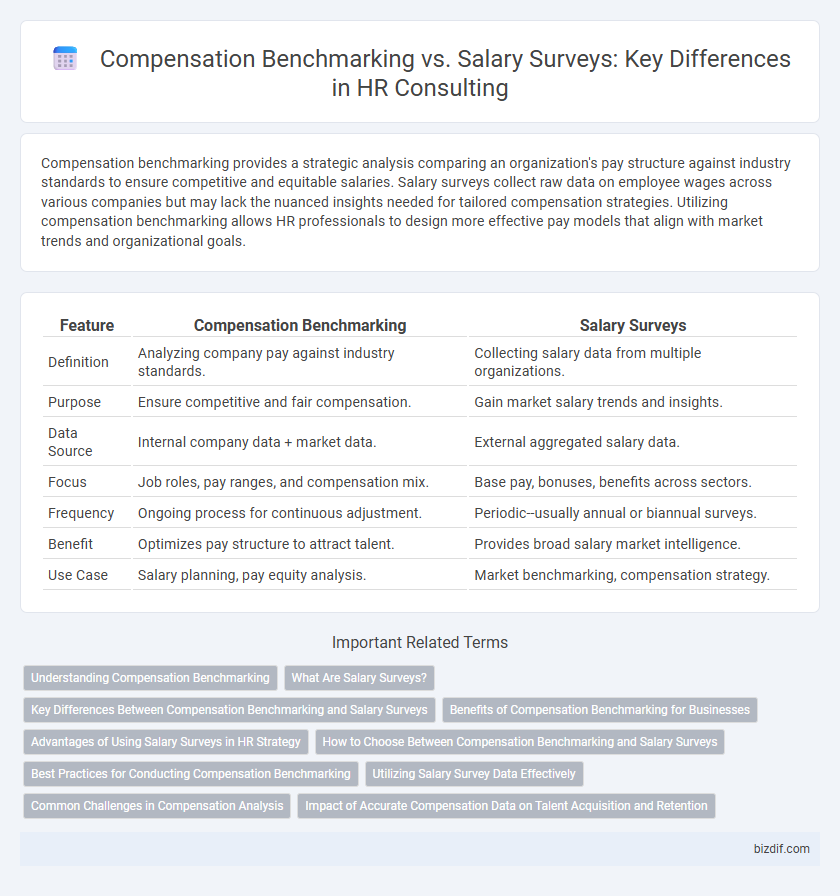Compensation benchmarking provides a strategic analysis comparing an organization's pay structure against industry standards to ensure competitive and equitable salaries. Salary surveys collect raw data on employee wages across various companies but may lack the nuanced insights needed for tailored compensation strategies. Utilizing compensation benchmarking allows HR professionals to design more effective pay models that align with market trends and organizational goals.
Table of Comparison
| Feature | Compensation Benchmarking | Salary Surveys |
|---|---|---|
| Definition | Analyzing company pay against industry standards. | Collecting salary data from multiple organizations. |
| Purpose | Ensure competitive and fair compensation. | Gain market salary trends and insights. |
| Data Source | Internal company data + market data. | External aggregated salary data. |
| Focus | Job roles, pay ranges, and compensation mix. | Base pay, bonuses, benefits across sectors. |
| Frequency | Ongoing process for continuous adjustment. | Periodic--usually annual or biannual surveys. |
| Benefit | Optimizes pay structure to attract talent. | Provides broad salary market intelligence. |
| Use Case | Salary planning, pay equity analysis. | Market benchmarking, compensation strategy. |
Understanding Compensation Benchmarking
Compensation benchmarking involves systematically comparing an organization's pay rates and structures against industry standards to ensure competitive and equitable remuneration. This process uses detailed market data and internal job analysis to align salaries with market trends and company strategy. Understanding compensation benchmarking helps HR professionals make data-driven decisions that attract and retain top talent while maintaining internal pay equity.
What Are Salary Surveys?
Salary surveys are systematic collections of data regarding employee compensation across various industries and job roles, providing detailed insights into base pay, bonuses, and benefits. These surveys enable HR professionals to evaluate market salary trends, ensuring competitive and equitable pay structures. Leveraging reliable salary survey data supports informed decision-making in compensation benchmarking and talent acquisition strategies.
Key Differences Between Compensation Benchmarking and Salary Surveys
Compensation benchmarking involves analyzing internal pay structures against market standards to develop competitive salary strategies, while salary surveys collect external data on salary ranges across industries and regions to inform compensation decisions. Benchmarking focuses on aligning pay with organizational goals and employee roles, providing customized insights, whereas salary surveys offer broad market trends and average compensation figures. Understanding these differences enables HR professionals to design equitable and competitive compensation packages that attract and retain talent effectively.
Benefits of Compensation Benchmarking for Businesses
Compensation benchmarking provides businesses with precise insights into industry salary standards, enabling competitive and fair pay structures that attract top talent. It helps identify pay gaps and market trends, ensuring alignment with organizational goals and legal compliance. Leveraging compensation benchmarking enhances employee satisfaction, retention rates, and overall workforce productivity by maintaining equitable and transparent compensation practices.
Advantages of Using Salary Surveys in HR Strategy
Salary surveys provide comprehensive market data that enables HR professionals to set competitive and equitable pay structures, enhancing talent attraction and retention. They offer current industry-specific benchmarks, ensuring compensation packages align with market trends and organizational goals. Leveraging salary surveys improves decision-making accuracy, supports compliance with pay regulations, and fosters internal pay equity.
How to Choose Between Compensation Benchmarking and Salary Surveys
Choosing between compensation benchmarking and salary surveys depends on organizational objectives, budget, and data specificity needs. Compensation benchmarking offers tailored insights by comparing internal roles against industry standards, ensuring salary structures align with strategic goals. Salary surveys provide broader market data, ideal for companies seeking extensive external pay information across multiple sectors or regions.
Best Practices for Conducting Compensation Benchmarking
Compensation benchmarking involves systematically comparing an organization's pay structures against industry standards to ensure competitive and equitable salaries, while salary surveys collect raw pay data from multiple companies. Best practices for conducting compensation benchmarking include selecting relevant peer groups aligned with company size and industry, using current and reliable data sources, and incorporating multiple data points such as base salary, bonuses, and benefits. Accurate benchmarking supports informed decision-making, drives talent retention, and maintains compliance with compensation regulations.
Utilizing Salary Survey Data Effectively
Salary survey data serves as a critical foundation for compensation benchmarking by providing accurate, up-to-date market salary information across industries and roles. Leveraging this data effectively requires analyzing trends, comparing job grades, and aligning compensation strategies to attract and retain top talent while maintaining internal equity. Integrating comprehensive survey insights with organizational goals enhances pay competitiveness and supports informed decision-making in HR strategy.
Common Challenges in Compensation Analysis
Compensation benchmarking and salary surveys both present challenges in compensation analysis, including data accuracy, market relevance, and role comparability. Variations in job titles and inconsistent survey methodologies often lead to misleading salary ranges. Ensuring up-to-date market data and aligning analysis with specific organizational roles are essential to overcome these hurdles.
Impact of Accurate Compensation Data on Talent Acquisition and Retention
Accurate compensation data derived from comprehensive salary surveys enables HR professionals to conduct precise compensation benchmarking, ensuring competitive salary packages that attract top talent. This data-driven approach reduces turnover rates by aligning employee pay expectations with market standards, fostering higher retention and job satisfaction. Leveraging reliable compensation insights supports strategic talent acquisition efforts, empowering organizations to secure skilled candidates and maintain a motivated workforce.
Compensation Benchmarking vs Salary Surveys Infographic

 bizdif.com
bizdif.com